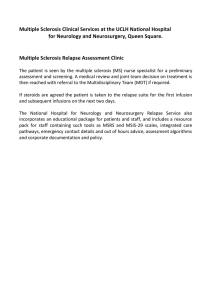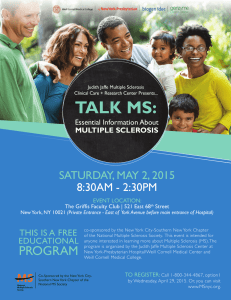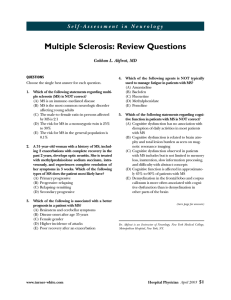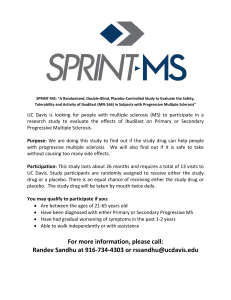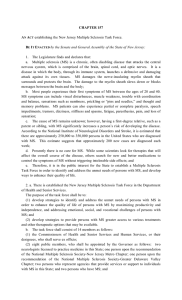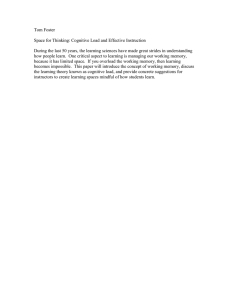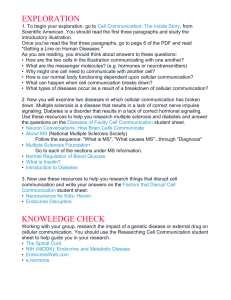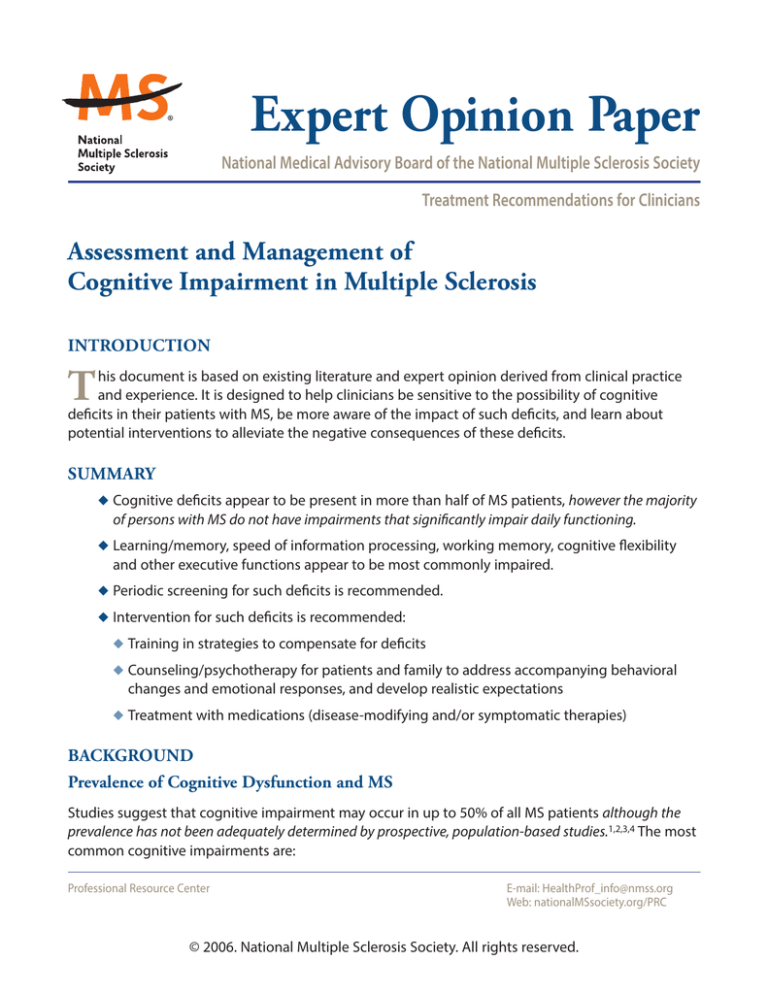
Expert Opinion Paper
National Medical Advisory Board of the National Multiple Sclerosis Society
Treatment Recommendations for Clinicians
Assessment and Management of
Cognitive Impairment in Multiple Sclerosis
INTRODUCTION
T
his document is based on existing literature and expert opinion derived from clinical practice
and experience. It is designed to help clinicians be sensitive to the possibility of cognitive
deficits in their patients with MS, be more aware of the impact of such deficits, and learn about
potential interventions to alleviate the negative consequences of these deficits.
SUMMARY
uCognitive deficits appear to be present in more than half of MS patients, however the majority
of persons with MS do not have impairments that significantly impair daily functioning.
u Learning/memory, speed of information processing, working memory, cognitive flexibility
and other executive functions appear to be most commonly impaired.
u Periodic screening for such deficits is recommended.
u Intervention for such deficits is recommended:
uTraining in strategies to compensate for deficits
u Counseling/psychotherapy for patients and family to address accompanying behavioral
changes and emotional responses, and develop realistic expectations
u Treatment with medications (disease-modifying and/or symptomatic therapies)
BACKGROUND
Prevalence of Cognitive Dysfunction and MS
Studies suggest that cognitive impairment may occur in up to 50% of all MS patients although the
prevalence has not been adequately determined by prospective, population-based studies.1,2,3,4 The most
common cognitive impairments are:
Professional Resource Center
E-mail: HealthProf_info@nmss.org
Web: nationalMSsociety.org/PRC
© 2006. National Multiple Sclerosis Society. All rights reserved.
From the National Medical Advisory Board
of the National Multiple Sclerosis Society
page 2
uImpaired learning and memory,5,6,7,8 i.e., encoding, storage, manipulation, retrieval of
information, especially episodic memory (experiential knowledge of events)
uSlowed information processing,9,10,11,12 i.e., reductions in speed of thinking that can affect
efficiency of cognitive function
u Impaired working memory,13,14 especially alternating attention (or shifting attention back and
forth between two stimuli—cognitive flexibility) and complex attention (simultaneously
attending to multiple stimuli)
uWhile less common, deficits in spatial abilities and higher executive function are recognized
and are detrimental to adaptive behavior15,16
Impact of Cognitive Function
Studies have clearly shown that individuals with cognitive decline are at greater risk for employment
problems.17 Those with moderate to severe cognitive dysfunction also have difficulty with activities
of daily living, may require personal assistance, and may experience problems in social situations.18,19,20
The impact on family relationships is also significant.21,22 Furthermore, the impact on driving may be
great enough that the individual is no longer safe behind the wheel.23,24
Often patients require cognitive evaluation to determine the extent to which their complaints, or the
concerns of others, are related to actual MS related cognitive decline, or other confounding factors
such as fatigue,25,26,27 and/or mood disorder.28,29,30 Adherence to medication and other therapeutic
regimens may also be affected by cognitive dysfunction; for example, training in injection
techniques for disease modifying agents may present greater challenges in patients with cognitive
dysfunction.31
Correlation between Cognitive Dysfunction and Other MS Characteristics
Cognitive impairment is difficult to predict on the basis of clinical presentation alone.
uHeterogeneity in cognitive deficits related to different disease courses is well
established.32,33,34
uBased on several studies,35,36,37 no or minimal correlation has been found between physical
disability and cognitive deficits. In fact, some studies have shown defective cognitive
function in patients with minimal physical disability.38,39,40
u Depression can give rise to deficiency in working-memory capacity.41
uCorrelation between cognitive dysfunction and fatigue has been observed in some studies
although not consistently.42,43 In one study, subjective fatigue across the workday increased
more for MS patients than for a control group but cognitive test performance was equal for
the two groups.44
u There is an ambiguous relationship between disease duration and cognition. Some
researchers find correlation between length of disease and cognitive status, while others
find no relationship.45,46,47
© 2006. National Multiple Sclerosis Society. All rights reserved.
From the National Medical Advisory Board
of the National Multiple Sclerosis Society
page 3
u A recent study showed a gender-related effect of clinical and genetic variables on cognitive
impairment in MS. Cognitive decline was predominant in men and was associated with
clinical and genetic variables while cognitive dysfunction in women was independent of
these variables.48
MRI Findings and Cognitive Dysfunction
While many factors can contribute to cognitive impairment (e.g., depression, premorbid ability), the
strong relationship between neuropsychological testing and brain MRI demonstrates that much of
the problem is due to cerebral disease (recent studies show large effects on the order of r = 0.7149,50).
uMany studies have shown that lesion volume is correlated with cognitive dysfunction in
MS.51,52,53,54,55
uStronger correlations have emerged with measures of brain atrophy,56,57 and cognitive
deterioration depends more on the development of brain parenchymal atrophy than on the
extent of lesion burden in the brain.58
u There are other promising MRI indicators that account for cognitive declines in MS, such as
regional brain atrophy,59 diffusion-tensor imaging,60 and N-acetylaspartate (NAA—indicative
of axonal integrity) levels,61 to name a few.
A goal for future research is to develop reliable neuroimaging methods that may be used to identify
patients at risk for cognitive impairment.62,63,64
RECOMMENDATIONS
Recommendations for Screening and Assessment
uProviders should consider periodic screening and/or assessment for cognitive deficits in
MS, as such deficits may not be always be apparent or reported. Cognitive dysfunction
may be difficult to detect because language skills and intellectual function are generally
preserved.65 Because of the high incidence of cognitive impairment in MS, its potentially
devastating consequences, as well as the advent of new therapies, periodic screening
(e.g., every 1–2 years) is recommended. Screening refers to the application of a simple,
inexpensive test that attempts to identify patients that (a) may have a specified illness or
condition and (b) would benefit from further evaluation (and in turn, treatment).
Recommended approaches:
uQuery the patient as well as the family regarding cognitive function. Report by family
members is closely correlated to cognitive deficits in the individual with MS.66 Note that
patient reports that are not confirmed by the family may reflect elevated depressive
symptoms (e.g., poor self image) rather than true or measurable cognitive deficits. On the
other hand, patients may not report symptoms that the family recognizes.
u Utilize self- and informant-report questionnaires The most appropriate self-report instrument
available at this time is the MS Neuropsychological Screening Questionnaire (MSNQ). This
© 2006. National Multiple Sclerosis Society. All rights reserved.
From the National Medical Advisory Board
of the National Multiple Sclerosis Society
page 4
is a brief (5-minute) questionnaire that is completed by the patient and by a family
member, and does not require a neuropsychologist or rehabilitation professional to
administer or score.67
Several other methods for screening for cognitive impairment have been proposed. (See
tables below.) Financial and time constraints in an outpatient practice may limit the use of
these instruments.
Examples of MS Screening Methods (in order of time requirements)
Name
First Author
Description
Recommended Administrator
Screening Examination
for Cognitive Impairment
in MS
W. Beatty
(1995)
Brief selection of NP tests
emphasizing tests of attention,
memory and problem-solving
requiring 25–30 min.
Neuropsychologist, or other
qualified rehabilitation specialist
(e.g., occupational therapist,
speech/language pathologist,
nurse practitioner, etc.)
Neuropsychological
Screening Battery for MS
S. Rao
(1991)
Brief selection of NP tests
emphasizing processing speed
and memory requiring 30–35
min.
Neuropsychologist, or other
qualified rehabilitation specialist
(e.g., occupational therapist,
speech/language pathologist,
nurse practitioner, etc.)
Automated
Neuropsychological
Assessment
Metrics—ANAM
J. Wilken
(2003)
A computerized selection of NP
tasks emphasizing tests of
reaction time, processing speed,
working memory, recognition
memory, visual reasoning, and
fine motor coordination requiring
approximately 30 min.
Neuropsychologist, or other
qualified rehabilitation specialist
(e.g., occupational therapist,
speech/language pathologist,
nurse practitioner, etc.)
Examples of MS Brief NP Test Batteries (in order of time requirements)
Name
First Author
Description
Brief Repeatable Battery of
Neuropsychological Tests in MS
(BRB)
S. Rao
(1991)
Tests were empirically derived from a larger battery of NP tests.
Included are the Paced Auditory Serial Addition Test, Symbol
Digit Modalities Test, Selective Reminding Test, 10/36 Spatial
Recall Test, and the Controlled Oral Word Association Test.
Approximate administration time 60 min.
Minimal Assessment of
Cognitive Function in MS
(MACFIMS)
R. Benedict
(2002)
Tests were rationally derived based on a consensus conference
sponsored by the Consortium of MS Centers. Included are the
Paced Auditory Serial Addition Test, Symbol Digit Modalities
Test, California Verbal Learning Test—II, Brief Visuospatial
Memory Test—Revised, Judgment of Line Orientation Test,
Controlled Oral Word Association Test, and the Sorting Test from
the Delis-Kaplan Executive Function System. Approximate
administration time 90 min.
© 2006. National Multiple Sclerosis Society. All rights reserved.
From the National Medical Advisory Board
of the National Multiple Sclerosis Society
page 5
The evaluation approach should be tailored to the clinical needs of the patient or clinic. Brief
objective testing batteries have been proposed for MS patients with known or suspected cognitive
deficits.68,69 There is also increasing interest in the use of single neuropsychological tests that can be
administered to identify patients who are cognitively impaired.70,71
Neuropsychological data can help identify areas of cognitive or behavioral change for such at-risk
patients, and provide baseline data for later comparisons. However, before neuropsychological
deficits are ascribed to multiple sclerosis, the influence of other medical conditions and medications
should be considered.
In certain circumstances, comprehensive neuropsychological evaluation is appropriate to consider,
including detailed exploration of deficits commonly associated with multiple sclerosis.72 Other
forms of cognitive evaluation may be administered by occupational and speech/language therapists
(as well as other health care providers) as part of the assessment process, and to guide clinical care.
The most common indicators for comprehensive neuropsychological evaluation are:
1.
Maintenance of employment
Patients struggling to maintain competitive employment. These patients need a detailed
review of residual strengths as well as weaknesses, so effective treatment can be designed
and delivered, and appropriate accommodations made in the workplace. Some patients
may be denied disability benefits on the basis of normal IQ testing, which lacks sensitivity
to MS-associated cognitive impairment. It is important to evaluate higher executive
functions in such patients.
2.
Independence in home and community
Patients struggling with family or household management, and/or activities of daily living
benefit from a clear delineation of neurocognitive and neurobehavioral strengths and
weaknesses.
3.
Educational attainment
Students of all ages whose educational activities require cognitive acumen, and who would
benefit from knowing how their residual abilities and difficulties are likely to impact success
in school, are also well served by more comprehensive neuropsychological evaluation. Test
results also help guide recommendations for accommodation in the classroom.
4.
Differential diagnosis, and/or co-morbid conditions
Consider additional testing where it is necessary to rule out other neurological conditions
such as Alzheimer’s disease or depression. In addition, for some patients, the level of
psychiatric distress or symptoms they develop may interfere with effective cognitive
function, even though major cognitive deficits are not present.
Cognitive re-evaluation is often recommended to ascertain whether there is evidence of
cognitive decline. Other clinical problems related to longitudinal analysis include:
© 2006. National Multiple Sclerosis Society. All rights reserved.
From the National Medical Advisory Board
of the National Multiple Sclerosis Society
page 6
1) Significant cognitive worsening has occurred, accompanied by a major depressive
episode; testing is needed to differentiate probable neurocognitive changes from mood
disorder, to help guide pharmacologic and other treatments.
2)
Cognitive function has continued to worsen in an older patient with MS, despite disease
modifying therapies that have helped maintain physical function; there are concerns
about a new, underlying cortical dementia such as Alzheimer’s disease.
3)
A patient, placed on medical leave from work secondary to cognitive problems at the
time of a major exacerbation, has improved, and the employer requests documentation
of current abilities to assist with successful return to work efforts.
Recommendations for Intervention and Management
uIntervention and management of cognitive dysfunction in MS is ideally performed by
certified and/or licensed health professionals experienced in cognitive rehabilitation, with
medication management provided by physicians or other appropriate health care providers,
e.g., nurse practitioners. Cognitive rehabilitation professionals include neuropsychologists,
psychologists, speech-language pathologists, and occupational therapists. The physicians
involved in medication management for cognitive problems are typically neurologists,
psychiatrists, or physiatrists (rehabilitation medicine physicians). Ideally, these professionals
should have an understanding of MS, including the disease process, common symptoms and
findings, and medical treatments (and their side effects). In addition, an understanding of
factors that may aggravate or complicate assessment, treatment and function of people with
MS—especially temperature-sensitivity, fatigue, and affective disturbance—is desirable.
uInterventions should be designed to improve the person’s ability to function in all
meaningful aspects of family and community life. Intervention should involve systematic,
functionally-oriented, therapeutic activities that are based on understanding of specific
deficits. Most commonly, compensatory strategies (i.e., utilizing intact skills and/or external aids)
are used to improve daily functioning. Examples include: cognitive structuring (a learned,
practiced approach used to routinize cognitive tasks); substitution strategies (the learned use
of intact cognitive abilities to circumvent or bolster impaired abilities, such as using intact
visual memory in place of impaired verbal memory function); scheduling and timelines; use
of recording devices; memory strategies (e.g., lists, mnemonics, clustering, visualization
techniques); templates for repeated tasks; organizational strategies; assistive technology
(e.g., hand held computers, electronic calendars and memory logs), creating a structured
environment; conducting conversations and activities in quiet places to minimize distraction;
etc. Solution-focused, practical training in how to maximize function in spite of deficits,
which can be generalized to the individual’s everyday environment, is most desirable.
Therapeutic activities designed to restore function (e.g., direct retraining) have also been
attempted. However, evidence of effectiveness is ambiguous and controversial. Although the
main body of literature suggests some benefit of intervention for people with
MS,73,74,75,76,77,78,79,80 other studies have not demonstrated a benefit.81,82,83 Furthermore,
improvement of scores on standardized tests may not necessarily be correlated with improved function
in everyday work or avocational situations.
© 2006. National Multiple Sclerosis Society. All rights reserved.
From the National Medical Advisory Board
of the National Multiple Sclerosis Society
page 7
u In some circumstances, interventions should be accompanied by counseling/psychotherapy
to address grief, decreased self-esteem, anxiety, and other emotional responses that may
accompany cognitive deficits. Concurrent emphasis on helping the individual redefine him/
her-self, develop effective coping strategies, increase communication skills, and learn to take
fullest advantage of his/her strengths to compensate for new areas of difficulties is paramount.
Involvement of family members in counseling is critical; in order to facilitate the individual’s
accommodation to deficits, families need to adjust their expectations to reflect those deficits.
u Like other clinical manifestations of MS, cognitive impairment—and especially worsening
cognitive impairment as indicated by cognitive testing—is a sign of active disease, and
should be viewed as justification for using disease modifying therapy or changing to a
different immunomodulator, as well as other medications that may address cognitive
symptoms. (For further clarification on the use of disease modifying agents, see the Society’s
Disease Management Consensus Statement.84) In patients who have dementia (some
10%–20% of MS patients85), medications shown to be effective for Alzheimer’s disease and
other types of dementia are appropriate.86,87,88 These same medications show promise for
mild cognitive impairment more often seen in patients with MS. A recent trial with Donepezil
HCl suggested improvement in many aspects of cognitive function70,89 though a smaller,
earlier trial did not.90 No benefit was found with the use of amantadine or 4-Aminopyridine in
some studies91,92 while improved attention was found in another.93 Symptomatic treatment of
fatigue and depression may also yield improvement in functional cognitive abilities.
Recommendations for Future Research
More research is needed to further evaluate cognitive rehabilitation and intervention in people with
MS across the spectrum of the illness.
Issues to be addressed include:
uBetter outcome measures
uThe role that individualized assessment might play before treatment
u Specific evaluation and treatment techniques
u Duration of treatment
u Duration of benefits.
REFERENCES
1. Bobholtz JA, Rao SM. Cognitive dysfunction in MS: A review of recent developments. Current
Opinion in Neurology 2003; 16:283–288.
2. Heaton RK. Neuropsychological findings in relapsing-remitting and chronic-progressive multiple
sclerosis. Journal of Consulting & Clinical Psychology 1985; 53:103–110.
3. Peyser JM, Edwards KR, Poser CM, Filskov SB. Cognitive function in patients with multiple
sclerosis. Archives of Neurology 1980; 37:577–579.
© 2006. National Multiple Sclerosis Society. All rights reserved.
page 8
From the National Medical Advisory Board
of the National Multiple Sclerosis Society
4. Rao SM, Leo GJ, Bernardin L, Unverzagt F. Cognitive dysfunction in multiple sclerosis.
I. Frequency, patterns, and prediction. Neurology 1991; 41:685–691.
5. Fischer JS. Using the Wechsler Memory Scale—Revised to detect and characterize memory
deficits in multiple sclerosis. Clinical Neuropsychology 1988; 2:149–172.
6. Rao SM. Neuropsychology of multiple sclerosis: A critical review. Journal of Clinical and
Experimental Neuropsychology 1986; 8:503–452.
7. DeLuca J, Barbieri-Berger S, Johnson SK. The nature of memory impairments in multiple
sclerosis: Acquisition versus retrieval. Journal of Clinical and Experimental Neuropsychology 1994;
16:183–189.
8. Amato MP, Ponzini G, Siracusa G, Sorbi S. Cognitive dysfunction in early onset MS: A reappraisal
after 10 years. Archives of Neurology 2001; 58:1602–1606.
9. Rao SM, Leo GJ, St. Aubin-Farbert P. Information processing speed in patients with multiple
sclerosis. Journal of Clinical and Experimental Neuropsychology 1989; 11:471–477.
10. DeLuca J, Johnson SK, Natelson BH. Information processing efficiency in chronic fatigue
syndrome and multiple sclerosis. Archives of Neurology 1993; 50:301–304.
11. Archibald CJ, Fisk JD. Information processing efficiency in patients with multiple sclerosis.
Journal of Clinical and Experimental Neuropsychology 2000; 22:686–701.
12. De Sonneville LM. Information processing characteristics in subtypes of MS. Neuropsychologia
2002; 40:1751–1765.
13. Rao SM, Grafman J, DiGiulio D, Mittenberg W, Bernardin L, Leo GJ, Luchetta T, Unveragt F.
Memory dysfunction in multiple sclerosis: Its relation to working memory, semantic encoding,
and implicit learning. Neuropsychology 1993; 7:364–374.
14. Fisk JD, Archibald CJ. Limitations of the Paced Auditory Serial Addition Test as a measure of
working memory in patients with multiple sclerosis. Journal of the International
Neuropsychological Society 2001; 7:363–372.
15. Beatty WW, Monson N. Problem solving by patients with multiple sclerosis: Comparison of
performance on the Wisconsin and California Card Sorting Test. Journal of the International
Neuropsychological Society 1996; 2:134–140.
16. Foong J, Rozewicz L, Quaghebeur G, Davie CA, Kartsounis LD, Thompson AJ, Miller DH, Ron MA.
Executive function in multiple sclerosis: The role of frontal lobe pathology. Brain 1997;
120:15–26.
17. Beatty WW, Blanco CR, Wilbanks SL, Paul RH. Demographic, clinical, and cognitive characteristics
of multiple sclerosis patients who continue to work. Journal of Neurological Rehabilitation 1995;
9:167–173.
18. Rao SM, Leo GJ, Ellington L, Nauertz T, Bernardin L, Unverzagt F. Cognitive dysfunction in
multiple sclerosis. II. Impact on employment and social functioning. Neurology 1991;
41(5):692–696.
© 2006. National Multiple Sclerosis Society. All rights reserved.
page 9
From the National Medical Advisory Board
of the National Multiple Sclerosis Society
19. Benedict RH, Wahlig E, Bakshi R, Fishman I, Munschauer F, Zivadinov R, Weinstock-Guttman B.
Predicting quality of life in multiple sclerosis: Accounting for physical disability, fatigue, cognition,
mood disorder, personality, and behavior change. Journal of the Neurological Sciences 2005;
231(1–2):29–34.
20. Wild KV, Lezak M, Whitman RH, Bourdette DN. Psychosocial impact of cognitive impairment in
the multiple sclerosis patient. Journal of Clinical and Experimental Neuropsychology 1991; 13:74.
21. Hakim EA, Bakheit AM, Bryant TN, Roberts MWH, McIntosh-Michaelis SA, Spackman AJ, Martin JP,
McLellan DL. The social impact of multiple sclerosis—A study of 305 patients and their relatives.
Disability & Rehabilitation 2000; 22(6):288–293.
22. Knight RG, Devereux RC, Godfrey HPD. Psychosocial consequences of caring for a spouse with
multiple sclerosis. Journal of Clinical and Experimental Neuropsychology 1997; 19:7–19.
23. Schultheis MT, Garay E, Millis SR, DeLuca J. Motor vehicle crashes and violations among drivers
with multiple sclerosis. Archives of Physical Medicine & Rehabilitation 2002; 83:1175–1178.
24. Schultheis MT, Garay E, DeLuca J. The influence of cognitive impairment on driving performance
in multiple sclerosis. Neurology 2001; 56:1089–1094.
25. Krupp LB, Sliwinski M, Masur DM, Friedberg F, Coyle PK. Cognitive functioning and depression in
patients with chronic fatigue syndrome and multiple sclerosis. Archives of Neurology 1994;
51:705–710.
26. Krupp LB. Fatigue and declines in cognitive functioning in multiple sclerosis. Neurology 2000;
55:934–939.
27. Krupp LB, LaRocca NG, Muir-Nash J, Steinberg AD. The fatigue severity scale. Application to
patients with multiple sclerosis and systemic lupus erythematosus. Archives of Neurology 1989;
46:1121–1123.
28. Arnett PA, Higginson CI, Voss WD, Bender WI, Wurst JM, Tippin JM. Depression in multiple
sclerosis: Relationship to working memory capacity. Neuropsychology 1999; 13:546–556.
29. Patten SB, Metz LM. Depression in multiple sclerosis. Psychotherapy and Psychosomatics 1997;
66:286–292.
30. Mohr DC, Goodkin DE, Gatto N, van der Wende J. Depression, coping and level of neurological
impairment in multiple sclerosis. Multiple Sclerosis 1997; 3:254–258
31. Holland N, Weisel P, Cavallo P, Edwards C, Halper J, Kalb R, et al. Adherence to disease-modifying
therapy in multiple sclerosis: Part 1. Rehabilitation Nursing 2001; 26(5):172–176.
32. Wachowius UJ. Cognitive impairment in primary and secondary progressive MS. Journal of
Clinical and Experimental Neuropsychology 2005; 27:65–77.
33. Huijbregts SC, Kalkers NF, de Sonneville LM, de Groot V, Reuling IE, Polman CH. Differences in
cognitive impairment of relapsing remitting, secondary, and primary progressive MS. Neurology
2004; 63(2):335–339.
© 2006. National Multiple Sclerosis Society. All rights reserved.
page 10
From the National Medical Advisory Board
of the National Multiple Sclerosis Society
34. De Sonneville LM. Information processing characteristics in subtypes of MS. Neuropsychologia
2002; 40:1751–1765.
35. Beatty WW, Goodkin DE, Hertsgaard D, Monson N. Clinical and demographic predictors of
cognitive performance in multiple sclerosis: Do diagnostic type, disease duration, and disability
matter? Archives of Neurology 1990; 47(3):305–308.
36. Peyser JM, Edwards KR, Poser CM. Psychological profiles in patients with multiple sclerosis: A
preliminary investigation. Archives of Neurology 1980; 37:437–440.
37. Rao SM, Leo GJ, Ellington L, Nauertz T, Bernardin L, Unverzagt F. Cognitive dysfunction in
multiple sclerosis. II. Impact on employment and social functioning. Neurology 1991;
41(5):692–696.
38. Olivares T, Nieto A, Sánchez MP, Wollmann T, Hernández MA, Barroso J. Pattern of
neuropsychological impairment in the early phase of relapsing-remitting multiple sclerosis.
Multiple Sclerosis 2005; 11:191–197.
39. Van Den Burg W, van Zomeren H, Minderhoud JM, Prange AJ, Meijer NS. Cognitive impairment
in patients with multiple sclerosis and mild physical disability. Archives of Neurology 1987;
44:494–501.
40. Haase CG, Tinnefeld M, Lienemann M, Ganz RE, Faustmann PM. Depression and cognitive
impairment in disability-free early multiple sclerosis. Behavioral Neurology 2003; 14(1–2):39–45.
41. Arnett PA, Higginson CI, Voss WD, Bender WI, Wurst JM, Tippin JM. Depression in multiple
sclerosis: Relationship to working memory capacity. Neuropsychology 1999; 13:546–556.
42. Frazer C, Stark S. Cognitive symptoms and correlates of physical disability in individuals with
multiple sclerosis. Journal of Neuroscience Nursing 2003; 35:314–320.
43. Krupp LB. Fatigue and declines in cognitive functioning in multiple sclerosis. Neurology 2000;
55:934–939.
44. Beatty WW, Goretti B, Siracusa G, Zipoli V, Portaccio E, Amato MP. Changes in neuropsychological
test performance over the workday in multiple sclerosis. Clinical Neuropsychology 2003;
17(4):551–560.
45. Rao SM, Leo GJ, Ellington L, Nauertz T, Bernardin L, Unverzagt F. Cognitive dysfunction in
multiple sclerosis. II. Impact on employment and social functioning. Neurology 1991;
41(5):692–696.
46. Peyser JM, Edwards KR, Poser CM, Filskov SB. Cognitive function in patients with multiple
sclerosis. Archives of Neurology 1980; 37:577–579.
47. Heaton RK, Nelson LM, Thompson DS, Burks JS, Franklin GM. Neuropsychological findings in
relapsing/remitting and chronic progressive multiple sclerosis. Journal of Consulting and Clinical
Psychology 1985; 53:103–110.
48. Saviettieri G, Messina D, Andreoli V, Bonavita S, Caltagirone C, Cittadella R, et al. Gender related
effect of clinical and genetic variables on the cognitive impairment in MS. Journal of Neurology
2004; 251:1208–1214.
© 2006. National Multiple Sclerosis Society. All rights reserved.
page 11
From the National Medical Advisory Board
of the National Multiple Sclerosis Society
49. Benedict RH, Weinstock-Guttman B, Fishman I, Sharma J, Tjoa CW, Bakshi R, et al. Prediction of
neuropsychological impairment in multiple sclerosis: Comparison of conventional magnetic
resonance imaging measures of atrophy and lesion burden. Archives of Neurology 2004;
61(2):226–230.
50. Christodoulou C, Krupp LB, Liang Z, Huang W, Melville P, Roque C, et al. Cognitive performance
and MR markers of cerebral injury in cognitively impaired MS patients. Neurology 2003;
60(11):1793–1798.
51. Franklin GM, Heaton RK, Nelson LM, Filley CM, Seibert C. Correlation of neuropsychological and
MRI findings in chronic/progressive multiple sclerosis. Neurology 1988; 38(12):1826–1829.
52. Fulton JC, Grossman RI, Udupa J, Mannon LJ, Grossman M, Wei L, Polansky M, Kolson DL. MR
lesion load and cognitive function in patients with relapsing-remitting multiple sclerosis.
American Journal of Neuroradiology 1999; 20(10):1951–1955.
53. Benedict RH, Weinstock-Guttman B, Fishman I, Sharma J, Tjoa CW, Bakshi R, et al. Prediction of
neuropsychological impairment in multiple sclerosis: Comparison of conventional magnetic
resonance imaging measures of atrophy and lesion burden. Archives of Neurology 2004;
61(2):226–230.
54. Christodoulou C, Krupp LB, Liang Z, Huang W, Melville P, Roque C, et al. Cognitive performance
and MR markers of cerebral injury in cognitively impaired MS patients. Neurology 2003;
60(11):1793–1798.
55. Rao SM, Leo GJ, Haughton VM, St Aubin-Faubert P, Bernardin L. Correlation of magnetic
resonance imaging with neuropsychological testing in multiple sclerosis. Neurology 1989;
39(2 Pt 1):161–166.
56. Christodoulou C, Krupp LB, Liang Z, Huang W, Melville P, Roque C, et al. Cognitive performance
and MR markers of cerebral injury in cognitively impaired MS patients. Neurology 2003;
60(11):1793–1798.
57. Pozzilli C, Bastianello S, Padovani A, Passafiume D, Millefiorini E, Bozzao L, Fieschi C. Interior
corpus callosum atrophy and verbal fluency in multiple sclerosis. Cortex 1991; 27(3):441–445.
58. Benedict RH, Carone DA, Bakshi R. Correlating brain atrophy with cognitive dysfunction, mood
disturbances, and personality disorder in multiple sclerosis. Journal of Neuroimaging 2004;
14(3 Suppl):36S–45S.
59. Benedict RHB, Zivadinov R, Carone D, Weinstock-Guttman B, Gaines J, Maggiore C, et al.
Regional lobar atrophy predicts memory impairment in multiple sclerosis. American Journal of
Neuroradiology 2005; 26:1824–1831.
60. Rovaris M, Iannucci G, Falautano M, Possa F, Martinelli V, Comi G, et al. Cognitive dysfunction in
patients with mildly disabling relapsing-remitting multiple sclerosis: An exploratory study with
diffusion tensor MR imaging. Journal of Neurological Science 2002; 195:103–109.
61. Pan JW, Krupp LB, Elkins LE, Coyle PK. Cognitive dysfunction lateralizes with NAA in multiple
sclerosis. Applied Neuropsychology 2001; 8:155–160.
© 2006. National Multiple Sclerosis Society. All rights reserved.
page 12
From the National Medical Advisory Board
of the National Multiple Sclerosis Society
62. Benedict RH, Weinstock-Guttman B, Fishman I, Sharma J, Tjoa CW, Bakshi R, et al. Prediction of
neuropsychological impairment in multiple sclerosis: Comparison of conventional magnetic
resonance imaging measures of atrophy and lesion burden. Archives of Neurology 2004;
61(2):226–230.
63. Carone DA, Benedict RH, Dwyer MG, Cookfair DL, et al. Semi-automatic brain region extraction
(SABRE) reveals superior cortical and deep gray matter atrophy in MS. NeuroImage 2006;
29(2):505-514.
64. Benedict RHB, Bakshi R, Simon JH, Priore R, Miller C, Munschauer F. Frontal cortex atrophy
predicts cognitive impairment in multiple sclerosis. Journal of Neuropsychiatry and Clinical
Neurosciences 2002; 14:44–51.
65. Rao SM. Neuropsychology of multiple sclerosis. Curr Opin Neurol 1995; 8:216–220.
66. Benedict RHB, Cox D, Thompson LL, Foley FW, Weinstock-Guttman B, Munschauer F. Reliable
screening for neuropsychological impairment in multiple sclerosis. Multiple Sclerosis 2004;
10(6):675–678.
67. Benedict RHB, Munschauer FE, Linn R, Miller C, Foley FW, Jacobs LD. Screening for multiple
sclerosis cognitive impairment using a self-administered 15-item questionnaire. Multiple Sclerosis
2003; 9:95–101.
68. Rao SM. Neuropsychological screening battery for multiple sclerosis. Unpublished manuscript,
Section of Neuropsychology, Department of Neurology, Medical College of Wisconsin. 1991.
69. Beatty WW, Paul RH, Wilbanks SL, Hames KA, Blanco CR, Goodkin DE. Identifying multiple
sclerosis patients with mild or global cognitive impairment using the Screening Examination for
Cognitive Impairment (SEFCI). Neurology 1995; 45:718–723.
70. Krupp LB, Christodoulou C, Melville P, Scherl WF, MacAllister WS, Elkins LE. Donepezil improved
memory in multiple sclerosis in a randomized clinical trial. Neurology 2004 Nov 9;
63(9):1579–1585.
71. Deloire M, Bonnet M, Salort E, Arimone Y, Boudineau M, Petry K, Brouchet B. The Symbol Digit
Modalities Test: A simple test to select early relapsing remitting multiple sclerosis patients for a
complete cognitive evaluation. Multiple Sclerosis 2005; 11(Suppl 1):66–75.
72. Pepping M, Ehde D. Neuropsychological evaluation and treatment of multiple sclerosis: the
importance of a neuro-rehabilitation focus. Phys Med Rehabil Clin N Am 2005 May; 16(2):411–436.
73. Jonsson A, Korfitzen EM, Heltberg A, Ravnborg MH, Byskov-Ottosen E. Effects of neuropsychological
treatment in patients with multiple sclerosis. Acta Neurologica Scandinavica 1993; 88(6):394–400.
74. Rodgers D, Khoo K, MacEachen M, Oven M, Beatty WW. Cognitive therapy for multiple sclerosis:
A preliminary study. Alternative Therapies in Health and Medicine 1996; 2(5):70–74.
75. Allen DN, Goldstein G, Heyman RA, Rondinelli,T. Teaching memory strategies to persons with
multiple sclerosis. Journal of Rehabilitation Research and Development 1998; 35(4):405–410.
© 2006. National Multiple Sclerosis Society. All rights reserved.
page 13
From the National Medical Advisory Board
of the National Multiple Sclerosis Society
76. Benedict RHB, Shapiro A, Priore RL, Miller C, Munschauer FE, Jacobs LD. Neuropsychological
counseling improves social behavior in cognitively-impaired multiple sclerosis patients. Multiple
Sclerosis 2001; 6:391–396.
77. Chiaravalloti ND, DeLucca J, Moore NB, Ricker JH. Treating learning impairments improves
memory performance in multiple sclerosis: A randomized clinical trial. Multiple Sclerosis 2005;
11:58–68.
78. Plohmann AM, Kappos L, Ammann W, Thordai A, Wittwer A, Huber S, Bellaiche Y, Lechner-Scott J.
Computer assisted retraining of attentional impairments in patients with multiple sclerosis.
Journal of Neurology, Neurosurgery, and Psychiatry 1998; 64:455–462.
79. Chiaravalloti N, DeLuca J. Self-generation as a means of maximizing learning in multiple sclerosis:
An application of the generation effect. Archives of Physical Medicine and Rehabilitation 2002;
83:1070–1079.
80. LaRocca N. Kalb R, Smith C, Elkin R et al. Comprehensive rehabilitation of cognitive dysfunction
in multiple sclerosis. Multiple Sclerosis 1998; 4(5): 460.
81. Shepko AG, Hollenbeck MA. Comparison of treatment duration for remediation of memory
impairment in individuals with multiple sclerosis. Multiple Sclerosis 1997; 3:208. (Consortium of
Multiple Sclerosis Centers Abstracts)
82. Lincoln NB, Dent A, Harding J, Weyman N, Nicholl C, Blumhardt LD, Playford ED. Evaluation of
cognitive assessment and cognitive intervention for people with multiple sclerosis. Journal of
Neurology, Neurosurgery and Psychiatry 2002; 72:93–98.
83. Solari A, Motta A, Mendozzi L, Pucci E, Forni M, Mancardi G, Pozzilli C. Computer-aided retraining
of memory and attention in people with multiple sclerosis: A randomized, double-blind controlled
trial. Journal of the Neurological Sciences 2004; 222(1–2):99–104. Erratum in Journal of the
Neurological Sciences 2004; 224(1–2):113.
84. Medical Advisory Board of the National Multiple Sclerosis Society. Disease Management
Consensus Statement. 2005. Retrieved October 2005 from http://www.nationalmssociety.org/
pdf/forpros/Exp_Consensus.pdf.
85. 86. Benedict RH, Bobholz J. Multiple sclerosis. Seminars in Neurology 2007; 27(1):78-85
86. Christodoulou C, Melville P, Scherl WF, Macallister WS, Elkins LE, Krupp LB. Effects of donepezil on
memory and cognition in multiple sclerosis. J Neurol Sci 2006; 15;245(1-2):127-136.
87. Taverni JP, Seliger G, Lichtman SW. Donepezil medicated memory improvement in traumatic
brain injury during post acute rehabilitation. Brain Injury 1998; 12(1):77–80.
88. Erkinjuntti T, Kurz A, Gauthier S, Bullock R, Lilienfeld S, Damaraju CV. Efficacy of galantamine in
probable vascular dementia and Alzheimer’s disease combined with cerebrovascular disease: a
randomised trial. Lancet 2002; 359(9314):1283–1290.
89. Greene YM, Tariot PN, Wishart H, Cox C, Holt CJ, Schwid S, Noviasky J. A 12-week, open trial of
donepezil hydrochloride in patients with multiple sclerosis and associated cognitive
impairments. Journal of Clinical Psychopharmacology 2000; 20(3):350–356.
© 2006. National Multiple Sclerosis Society. All rights reserved.
From the National Medical Advisory Board
of the National Multiple Sclerosis Society
page 14
90. Rorie KD, Stump DA, Jeffery DR. Effects of Donepezil on cognitive function in patients with
multiple sclerosis. Neurology 2001; 56(Suppl 3):A99.
91. Smits RC, Emmen HH, Bertelsmann FW, Kulig BM, van Loenen AC, Polman CH. The effects of
4-aminopyridine on cognitive function in patients with multiple sclerosis: A pilot study.
Neurology 1994; 44(9):1701–1705.
92. Geisler MW, Sliwinski M, Coyle PK, Masur DM, Doscher C, Krupp LB. The effects of amantadine
and pemoline on cognitive functioning in multiple sclerosis. Archives of Neurology 1996;
53(2):185–188.
93. Cohen RA, Fisher M. Amantadine treatment of fatigue associated with MS. Neurology 1989;
46:676–680.
National MS Society Cognition and MS Task Force
Ralph H. B. Benedict, PhD, ABPP-CN, Chairman
Aliza Ben-Zacharia, RN, CRRN, MSN, ANP-C
Patricia A. Bednarik, MS, CCC-SLP
Francois Bethoux, MD
Julie A. Bobholz, PhD
Lauren S. Caruso, PhD
Nancy D. Chiaravalloti, PhD
Christopher Christodoulou, PhD
Debra Frankel, MS, OTR
Jacqueline Hall MS, OTR/L
Nancy Holland, EdD
George H. Kraft, MD
Lauren Krupp, MD
Nicholas LaRocca, PhD
Robert Mendoza, PhD
Mary Pepping, PhD, ABPP-CN
Ken Seaman MA, PT, ACCE
Randy Schapiro, MD
© 2006. National Multiple Sclerosis Society. All rights reserved.

